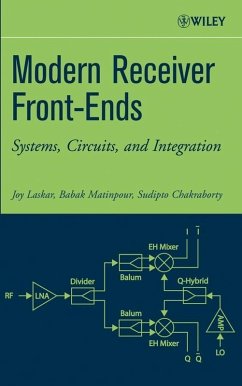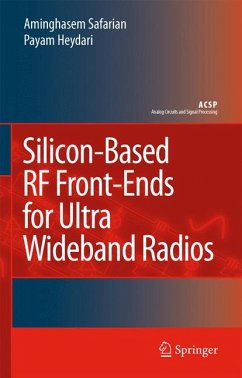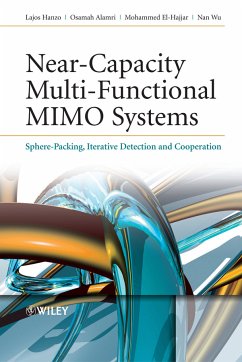
Digital Compensation for Analog Front-Ends (eBook, PDF)
A New Approach to Wireless Transceiver Design
Versandkostenfrei!
Sofort per Download lieferbar
117,99 €
inkl. MwSt.
Weitere Ausgaben:

PAYBACK Punkte
0 °P sammeln!
The desire to build lower cost analog front-ends has triggered interest in a new domain of research. Consequently the joint design of the analog front-end and of the digital baseband algorithms has become an important field of research. It enables the wireless systems and chip designers to more effectively trade the communication performance with the production cost. Digital Compensation for Analog Front-Ends provides a systematic approach to designing a digital communication system. It covers in detail the digital compensation of many non-idealities, for a wide class of emerging broadband sta...
The desire to build lower cost analog front-ends has triggered interest in a new domain of research. Consequently the joint design of the analog front-end and of the digital baseband algorithms has become an important field of research. It enables the wireless systems and chip designers to more effectively trade the communication performance with the production cost. Digital Compensation for Analog Front-Ends provides a systematic approach to designing a digital communication system. It covers in detail the digital compensation of many non-idealities, for a wide class of emerging broadband standards and with a system approach in the design of the receiver algorithms. In particular, system strategies for joint estimation of synchronization and front-end non-ideality parameters are emphasized. The book is organized to allow the reader to gradually absorb the important information and vast quantity of material on this subject. The first chapter is a comprehensive introduction to the emerging wireless standards which is followed by a detailed description of the front-end non-idealities in chapter two. Chapter three then uses this information to explore what happens when the topics introduced in the first two chapters are merged. The book concludes with two chapters providing an in-depth coverage of the estimation and compensation algorithms. This book is a valuable reference for wireless system architects and chip designers as well as engineers or managers in system design and development. It will also be of interest to researchers in industry and academia, graduate students and wireless network operators. * Presents a global, systematic approach to the joint design of the analog front-end compensation, channel estimation, synchronization and of the digital baseband algorithms * Describes in depth the main front-end non-idealities such as phase noise, IQ imbalance, non-linearity, clipping, quantization, carrier frequency offset, sampling clock offset and their impact on the modulation * Explains how the non-idealities introduced by the analog front-end elements can be compensated digitally * Methodologies are applied to the emerging Wireless Local Area Network and outdoor Cellular communication systems, hence covering OFDM(A), SC-FDE and MIMO * Written by authors with in-depth expertise developed in the wireless research group of IMEC and projects covering the main broadband wireless standards
Dieser Download kann aus rechtlichen Gründen nur mit Rechnungsadresse in D ausgeliefert werden.












